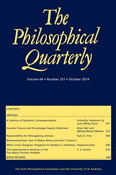-
Views
-
Cite
Cite
Silvia Jonas, Constructing the World, The Philosophical Quarterly, Volume 64, Issue 257, October 2014, Pages 651–655, https://doi.org/10.1093/pq/pqu032
Close - Share Icon Share
Extract
In this monumental work (containing eight chapters and seventeen ‘excursuses’), David Chalmers sets out ‘to specify the structure of the world in the form of certain basic truths from which all truths can be derived’ (p. xviii). His project is congenial to Carnap's Aufbau yet shorn of its empiricist implications (p. xviii). While Carnap held that all truths about the world can be constructed from a single primitive concept of phenomenal similarity plus logical concepts, the central thesis of Chalmers’ book is that, given ideal reasoning, all truths about the world can be determined from a compact class of truths. This thesis is referred to as ‘scrutability’ and comes in three main variations: ‘Inferential Scrutability’, ‘Conditional Scrutability’ and ‘A Priori Scrutability’ (p. 39ff). Chalmers focuses on the latter because it avoids the Fitchean problems faced by inferential scrutability and problems of subject-relativity arising for conditional scrutability (p. 60). He expects a priori scrutability to yield significant responses to problems of knowability and scepticism, modality, meaning, concepts and mental content, metaphysics, scientific analysis, and metaphilosophy (pp. 26–28).





